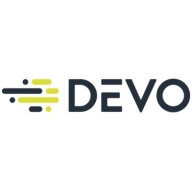

OpenText Behavioral Signals and Devo compete in the analytics and insights domain. OpenText Behavioral Signals is notable for its innovative emotion AI capabilities, giving it an edge in terms of emotional insight, while Devo is recognized for strong data analytics features and comprehensive data processing capabilities.
Features: OpenText Behavioral Signals is known for its emotion-driven AI technology, offering deep insights into user interactions. Devo focuses on advanced analytical tools for large datasets, boasting robust data processing and visualization capabilities. OpenText emphasizes behavioral insights, while Devo excels in data management and querying efficiency.
Room for Improvement: OpenText Behavioral Signals could enhance its integration capabilities and expand on AI customization options. It also has room to improve its scalability for diverse enterprise environments. Devo could benefit from making its deployment process more user-friendly, improving initial onboarding support satisfaction, and reducing dependency on technical expertise for setup.
Ease of Deployment and Customer Service: OpenText Behavioral Signals provides a straightforward deployment process and is well-regarded for responsive customer support. Devo, while efficient in post-connection support, requires more technical expertise for deployment compared to the user-friendly setup offered by OpenText.
Pricing and ROI: OpenText Behavioral Signals offers competitive pricing, balancing affordability with solid features for a favorable ROI. In contrast, Devo, while more costly upfront, presents potential for strong long-term returns through its comprehensive analytics tools, emphasizing value over affordability.
| Product | Market Share (%) |
|---|---|
| Devo | 1.1% |
| OpenText Behavioral Signals | 0.5% |
| Other | 98.4% |


| Company Size | Count |
|---|---|
| Small Business | 7 |
| Midsize Enterprise | 4 |
| Large Enterprise | 11 |
Devo is the only cloud-native logging and security analytics platform that releases the full potential of all your data to empower bold, confident action when it matters most. Only the Devo platform delivers the powerful combination of real-time visibility, high-performance analytics, scalability, multitenancy, and low TCO crucial for monitoring and securing business operations as enterprises accelerate their shift to the cloud.
OpenText Behavioral Signals enhances organizational security monitoring with its robust correlation engine and streamlined dashboard, offering customization to suit different environments like airports or banks.
OpenText Behavioral Signals effectively integrates device logs through its strong correlation engine. The platform's customization options enable tailored alerts to match specific use cases, such as airports or banks. Although it needs more frequent updates to stay aligned with global incidents, it provides a centralized dashboard that ensures comprehensive visibility across networks. Users find the interface intuitive, making rule writing and report access easy, aiding in a comprehensive understanding of the network environment.
What are the key features of OpenText Behavioral Signals?In industries like banking and airports, OpenText Behavioral Signals is implemented for gathering global intelligence from the cloud. It notifies organizations about global attacks and updates its correlation engines. These industries utilize the platform for monitoring and analyzing logs from network devices, security log management, and addressing network challenges like link failures and unauthorized login attempts, ensuring better security posture with behavioral analytics and log integration using Unix and Microsoft-based connectors.
We monitor all Security Information and Event Management (SIEM) reviews to prevent fraudulent reviews and keep review quality high. We do not post reviews by company employees or direct competitors. We validate each review for authenticity via cross-reference with LinkedIn, and personal follow-up with the reviewer when necessary.